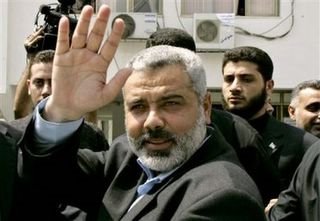Hamas Threatens to End Truce With Israel

Palestinian Prime Minister Ismail Haniyeh waves to supporters following a news conference at the Health Ministry in Gaza Monday, April 24, 2006. Palestinian Authority President Mahmoud Abbas said in an interview broadcast Monday that he has the authority to remove the newly elected Hamas government from power, and he warned the government it had little choice but to negotiate with Israel. (AP Photo/Hatem Moussa)

By AMY TEIBEL, Associated Press Writer
April 24, 2006
JERUSALEM - Hamas angrily rejected a warning by the moderate Palestinian president Monday that he could dismiss its month-old government, threatening to scrap a truce with Israel if he does.
The public warning heightened tensions between the Islamic militant group and President Mahmoud Abbas, who heads the Fatah Party. Hamas defeated Fatah in January parliamentary elections. Abbas, elected separately, has been trying to trim the powers of the new Cabinet.
In an interview broadcast Monday on CNN-Turk, Abbas said Hamas must recognize Israel and talk peace to avert an economic catastrophe because of Western sanctions.
Abbas favors peace talks, but Hamas rejects the presence of a Jewish state in the Middle East. Hamas also refuses to renounce violence or accept interim Palestinian-Israeli peace accords — basic international demands.
The extreme Hamas stance has harmed the Palestinians' world standing. More critically, it has led to a cutback in vital foreign aid, leaving Hamas unable to pay 165,000 public workers, the largest sector in the limping Palestinian economy, including about 80,000 in the security forces, many loyal to Fatah.
The current paychecks are already three weeks late, and next week another monthly salary is due, with no relief in sight, reinforcing Abbas' warning.
"The constitution gives me clear and definite authority to remove a government from power, but I don't want to use this authority. Everyone should know that by law this power is in my hands," Abbas said in the interview with CNN-Turk, recorded before he arrived in Turkey on Sunday.
Hamas reacted angrily, threatening to call off a 15-month truce brokered by Abbas that greatly reduced Israeli-Palestinian violence after five years of bloodshed.
A senior Hamas official, who spoke on condition of anonymity because he was not authorized to speak to the media, said the group would "not leave in silence."
"We will not participate in any new election and we will go underground as we did before and we will not adhere to any commitments, any truce, by anyone," he said.
An Israeli government spokesman, Raanan Gissin, dismissed the Hamas threat, saying the militant group had never recognized the truce. Although it suspended its suicide bombing campaign after the cease-fire was reached, Hamas was in league with other militant groups that did attack Israel, Gissin charged, "and it never renounced terrorism."
A spokesman for the Hamas-led government, Ghazi Hamad, said Abbas should not have warned Hamas he could disband the government, sworn in on March 29, so early in its tenure.
"We expect from President Abbas to protect his government and not to make such declarations," Hamad said in an interview from Gaza City.
Aides to Abbas said his warning was directed at Khaled Mashaal, the Hamas leader who accused the Palestinian president last week of "plotting" against the militant group. Mashaal's accusation set off clashes and protests over the weekend.
The West, which provides the Palestinians with roughly $1 billion in annual aid, has cut off some of that funding to protest Hamas' refusal to moderate. Palestinian officials say U.S. pressure on international banks has kept Arab governments' money from reaching the Hamas government.
Israel has also squeezed the Palestinians financially by withholding monthly transfers of some $55 million in taxes it collects on behalf of the Palestinian Authority.
Abbas does not plan to dissolve the government soon and will do so only if the economic situation in the territories becomes catastrophic, the aides said.
Under Palestinian law, if Abbas dissolves the government, he would ask someone else to try to form a Cabinet, which would need approval from the Hamas-dominated legislature. Once Abbas determines there is a stalemate, he has the authority to order new elections.
There is evidence that the financial crunch may be starting to erode Hamas' support. Thousands have demonstrated at government offices because of the tardy paychecks, though most of the protesters were affiliated with Fatah. Opponents of the Hamas regime believe if it is unable to govern, it will fall.
Abbas spoke with CNN in both Arabic and English, and the interview was broadcast with a Turkish voice-over. CNN-Turk provided The Associated Press with a full transcript of Abbas' remarks, translated into Turkish.
In the interview, Abbas said Hamas must negotiate with Israel unless it wants to lead the Palestinian people into a humanitarian catastrophe.
"Hamas has to face the facts and establish communication with Israel," he said. "I'm worried that the situation will turn into a tragedy in the near future. A short time later we could be up against a great hunger disaster in Palestine."
The Palestinian leader vowed to work to solve the Israeli-Palestinian crisis with or without Hamas.
"Hamas can support me or not. When I find a way to a solution with Israel, I'll present this to the Palestinian people in a referendum," he said.
Israel has not been in serious contact with Abbas since Hamas took power. The Israelis say they favor peace talks, but officials say they cannot regard the Palestinian Authority as a two-headed entity, ignoring Hamas.














0 Comments:
Post a Comment
<< Home